I edit my CV down. Nothing I did in grad school is there anymore. The undergraduate senior essay prize I was so proud of came off when I got my first job. Talks I’ve given in more minor circumstances or that I’ve given more than once aren’t all there anymore. I keep a running complete list in my own files, but nobody looking at my vita needs to be bored with every last conference presentation I’ve ever made, and now that I’m (shudder) a mid-career academic, the things I did very early on just don’t matter that much anymore.
I’m editing my CV now for the end of the academic year and in anticipation of being able to share a new accomplishment when it’s announced publicly in the coming days. It’s a good stock-taking exercise, too. I realized that this year is the year that my book reviews all spiraled out of control into full-length essays, which has occasioned a chance to think about the kind of work I want to do and how I might situate myself as a historiographer as well as a cultural historian.

Soul-searching vis-a-vis the field of Medieval Studies and its history and implication in the current edition of the culture wars has returned to the fore in the wake of a NYTimes article published over the weekend that presented issues of race and white supremacy in and around the field as a series of social media spats as much as anything.
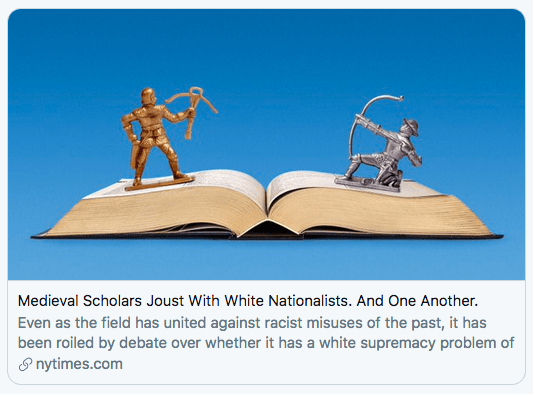
In the wake of this, I’m in New York to see the first half of Wagner’s Ring Cycle at the Met Opera. (The logistics are complicated; I had initially planned to be back to New York from Michigan by now and bought my tickets based on that assumption. I’m not, but I was able to schedule some meetings on campus in conjunction with a workshop I co-led at Cornell over the weekend, such that the timing worked out for me to be able to at least see the first half. Be that as it may.) Wagner is, of course, all kinds of implicated in genocidal white supremacy. But I love the music and, as Ernst Bloch (whose Avodat Kodesh I also love), I’m not prepared to cede it to the Nazis. The Ring is not particularly subtle, which is part of why I like it. It’s big and bombastic. It’s also very obvious the ways in which it originated in German nationalist folklore and how and why it appealed to Hitler. I can appreciate the music while utterly renouncing the convictions of the composer and the ways in which his work was put to political use. That’s what I meant when I wrote this tweet: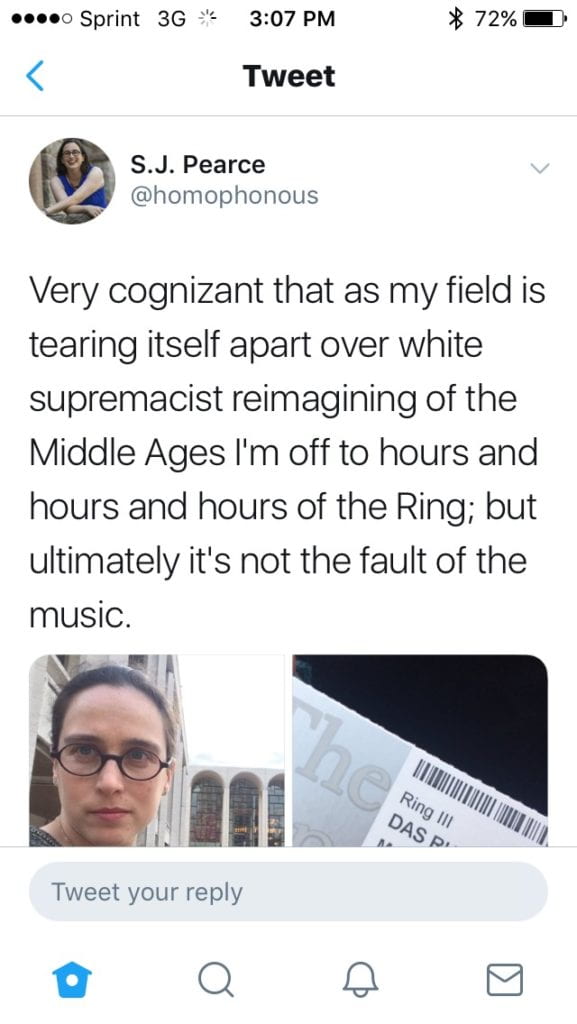
I was almost immediately questioned aggressively by the two directors of an open-access academic press who tweet in the voice of a corporate “we” that I find oddly disquieting. My interactions with them in the past have begun with equal measures of bombast, self-righteousness, and aggression. It, as the kids these days say, escalated quickly.
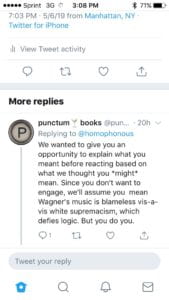
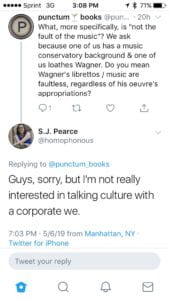
I’m not sure why this press feels that it is the position to paternalistically “offer” me the “opportunity” to explain myself or is entitled to an answer, what one of its editorial directors hating Wagner has to do with it, or why my disinterest in talking to a hostile, disembodied, corporate “we” in 280-character bursts means that I’m a white supremacist, but here we are.
As much as white, Christian progressives in my field are signing onto a kind of “cancel culture” that demands renunciation of works of art created by despicable people who hold views inimical to their individual lives, I don’t have that luxury. If I were to give up every work of literature written by an anti-Semite, the horizons of my written world would become small and impoverished. (Don’t tell, but I love T.S. Eliot, too.) I’ve written, too, about how as an Arabist I don’t have the luxury of not using a dictionary that that was written for the express purpose of translating Mein Kampf into Arabic. As a Hispanist, I don’t have the luxury of not dealing with archivists and librarians who held positions, and gladly, in Franco’s government. It’s easy and satisfying, I’m sure, to renounce all of these things and be done with them. It’s harder but more necessary to live in the world as it is, working to mitigate the harms of reality.
I was really proud to have been awarded the Michael Camille Memorial Essay Prize in 2014 for work I did on the only surviving manuscript of Judah ibn Tibbon’s ethical will. To me, receiving an award named after an art historian affirmed the interdisciplinary nature of my work and my ability to speak to scholars trained in many fields of study, which, as the odd-duck Arabist in the back corner of a Spanish department, I have always seen as an important part of my academic portfolio. It was rewarding to have that work and those skills validated publicly. But the award is made by the journal Postmedieval and the Babel Working group, both of which are adjacent to Punctum Books and have heavy involvement from one of its editorial directors. As proud as I am of that award, I don’t really want a prize awarded by a body headed by someone who will so quickly and inaccurately fling about accusations of white supremacy, and fling them at me. So at least for the time being, in this round of editing down my CV, I’m going to remove that award. I already have tenure. I don’t need to prove myself through my CV in the way that I used to. In this instance I do have the luxury to be able to stand on principle now.
Lucky her she’s not a medievalist, but Roxanne Gay posted this recently:
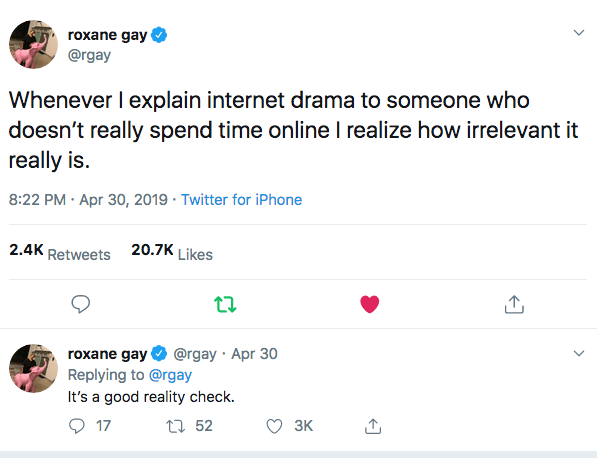
If I could find a way to write this all up without making it sound simultaneously bonkers and like nothing more than Twitter-gone-wrong (as if a Twitter spat were the telos) I’d write to the editorial board and, five years on, decline the prize and return the money that came with the award. I’m still thinking it through, and I don’t know that I have the rhetorical skill to pull it off; Twitter truly warps a person’s thinking and writing when it all comes to this. The state of play right now is crazy-making. Instead, as it stands, I think I will handle this by making a contribution in the amount of the Camille prize, in Michael Camille’s memory, to an organization that I have worked for and support regularly that fights discrimination from within my own broader religious community directed at non-Orthodox Jews and, especially, Jews of Color.
I try to take seriously the responsibility of honoring the memory of the scholars who shaped my thinking and my work. (And in fact, another piece of my complicated appreciation of Wagner is due to the fact that he was the favored composer of one of my teachers, who not only taught me how to be a cultural historian, but also a human being. And so I listen to Wagner for myself, but also in honor of her memory.) Part of the reason I was so proud to have received an award in his memory is because it was his book on the 19th-century renovations of Notre Dame (it’s really all coming crashing, coincidentally, down in the last few weeks, no?) that introduced me to the ideas of medievalism and reception history as fields of inquiry. But for right now, I think that the best choice I can make is to take the award, and his name as it is associated with bad actors in the field who seem invested in maligning me, off my CV for a while and hope that better days will come when I can return it to its place.
